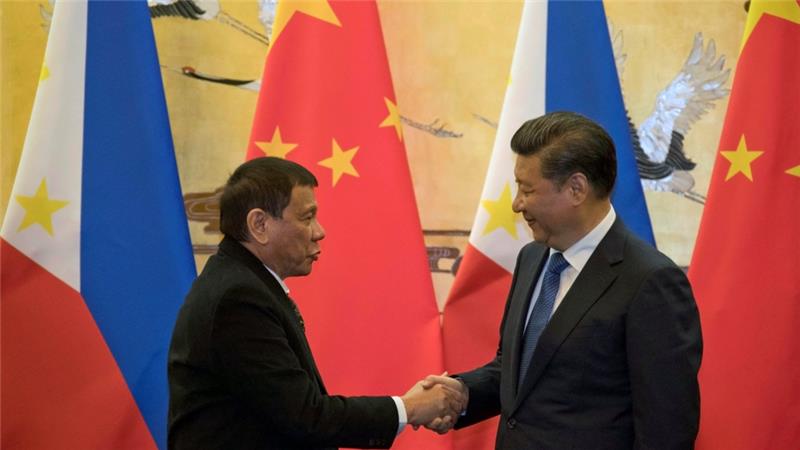- This is a unique opportunity to score a coup de grace by taking
the Philippines out of the American strategic orbit.
Al Jazeera
Richard Javad Heydarian
![Philippine President Rodrigo Duterte and Chinese President Xi Jinping after a signing ceremony in Beijing, China [Reuters]](https://www.aljazeera.com/mritems/imagecache/mbdxxlarge/mritems/Images/2016/10/27/ee9fef315330432ab3dbe4d4b2c4339c_18.jpg)
Goodbye” America, declared the Philippines’ firebrand leader Rodrigo Duterte ahead of his meeting with Chinese President Xi Jinping. Shortly after, he dropped another bombshell.
“I’ve realigned myself in [China] ideological flow and maybe I will also go to Russia … there are three of us against the world – China, Philippines and Russia. It’s the only way.”
This was nothing short of geopolitical drama on steroids.
Amid an intensifying rift between Washington and Manila over human rights concerns, Duterte embarked on a historic visit to China. Traditionally, Filipino leaders have visited the White House ahead of any major overseas seat of power, or at least the Zhongnanhai.
This time, however, Duterte did not only engage in an unprecedented public squabble with Washington over his controversial campaign against illegal drugs, but also opted to postpone a scheduled visit to Tokyo in favour of Beijing.
Alliance of sorts with China
It was a decision that came against the backdrop of Duterte’s suggested “alliance” of sorts with China, which has enthusiastically backed the Filipino leader’s war on drugs and is negotiating a 25-year military deal with the Philippines.
During his four-day visit, Duterte aimed to break the ice in frosty Philippine-China relations; expand areas of economic cooperation; and negotiate a modus vivendi in the South China Sea.
Showing that he means business, Duterte was accompanied by practically all Filipino business tycoons. More than $24bn in commercial agreements were signed between the two countries, eclipsing the economic dividends of recent overseas visits by any Filipino leader.
The Chinese definitely rolled out the red carpet, showering him with praises and wooing the Filipino strongman with economic incentives, specifically big-ticket projects to revamp the Philippines’ decrepit public infrastructure.
Most crucially, however, the two sides discussed, albeit surreptitiously, potential areas of compromise in the South China Sea, namely a joint fisheries agreement in the Scarborough Shoal and a joint exploration deal in the energy-rich Reed Bank.
In their joint statement, the two former rivals agreed to “make concerted efforts to cement the traditional friendship of the two peoples”.
“Without a doubt, under Duterte’s presidency, the Philippines is undergoing a seismic shift, both in its domestic political landscape and foreign policy predisposition. But whether the Filipino leader’s diplomatic flirtation with China will translate into an enduring strategic partnership is far from assured.
Quantum leap
Duterte’s pragmatic engagement and cordial exchanges with China represent a potential volte-face in Philippine foreign policy, at least rhetorically.
Just a few months ago, under President Benigno Aquino, Manila stood as one of the fiercest critics of Beijing’s maritime assertiveness in adjacent waters.
Duterte’s predecessor, on multiple occasions, went so far as likening China to Nazi Germany in the hope of rallying international support against the Asian powerhouse. The newly elected government in the Philippines, however, has had an entirely different game plan in mind.
Shortly after his election victory, Duterte called for an “independent” foreign policy that is less reliant on Washington. He also called for peaceful dialogue and joint development of contested features based on bilateral negotiations.
For Duterte, America has taken the Philippines for granted, given the Obama administration’s equivocation on whether the 1951 Mutual Defense Treaty covers Philippine claims in the South China Sea and the relatively limited military aid the Southeast Asian country receives in comparison to non-allied partners such as Egypt, Jordan and Pakistan.
When confronted with Western criticism of his human rights record, Duterte upped the ante by threatening to expel American Special Forces stationed in the Philippines, terminate joint patrols and military exercises in the South China Sea, and, at one point, even imply an abrogation of bilateral security agreements.
Meanwhile, he called for an alliance with China and Russia, an announcement that caught the Philippine security establishment by surprise.
Beyond his bluster, it is likely that Duterte aims to extract maximum concessions from both China and America by playing them against each other.
Specifically, he is offering China a downgrade in Philippine military relations with America in exchange for concessions in the South China Sea. Meanwhile, he is dangling the “Beijing card” to compel Washington to be more generous in military aid and less critical of his policies.
Strategic indeterminacy
Duterte’s overtures also represent a stark dilemma for China. On one hand, this is a unique opportunity to score a coup de grace by taking the Philippines out of the American strategic orbit.
On the other hand, Beijing is worried about the durability and reliability of their Filipino counterpart, who is known as both prickly and highly populist in a country that harbours deep anti-Chinese sentiments and is largely pro-American.
There is also a limit to Duterte’s charm offensive. No matter how many economic incentives Beijing offers, if it refuses to grant the Philippines any major concessions in the South China Sea and/or reneges on its earlier pledges then Duterte is expected to shift gear and adopt a more strident approach towards Beijing lest he faces political backlash if not impeachment. Then you have constitutional restrictions on any joint development agreement within Philippine-claimed waters. Duterte’s bigger concern is the Philippine security establishment, which is deeply suspicious of China and is broadly reliant on full-spectrum American military assistance. A full-fledged strategic alignment with Beijing will definitely not sit well with them.
Nonetheless, Duterte’s immediate objective, which is to peacefully manage maritime disputes with China and diversify Philippine relations, is sensible, though this shouldn’t necessarily come at the expense of long-standing relations with “all-weather” allies such as America.




